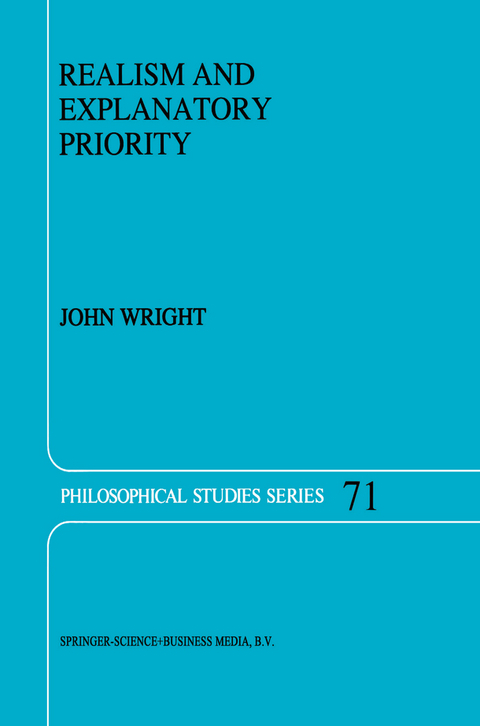
Realism and Explanatory Priority
Seiten
2010
|
Softcover reprint of the original 1st ed. 1997
Springer (Verlag)
978-90-481-4823-3 (ISBN)
Springer (Verlag)
978-90-481-4823-3 (ISBN)
One of the central areas of concern in late twentieth-century philosophy is the debate between Realism and anti-Realism. It is argued that this approach enables us to clarify the exact nature of the empirical evidence that would be required to establish Realism in any area.
One of the central areas of concern in late twentieth-century philosophy is the debate between Realism and anti-Realism. But the precise nature of the issues that form the focus of the debate remains controversial. In Realism and Explanatory Priority a new way of viewing the debate is developed. The primary focus is not on the notions of existence, truth or reference, but rather on independence. A notion of independence is developed using concepts derived from the theory of explanation. It is argued that this approach enables us to clarify the exact nature of the empirical evidence that would be required to establish Realism in any area. The author defends a restricted form of Realism, which he calls Nomic Structuralism.
The book will be suitable for professional philosophers of language, science and metaphysics, and their graduate students.
One of the central areas of concern in late twentieth-century philosophy is the debate between Realism and anti-Realism. But the precise nature of the issues that form the focus of the debate remains controversial. In Realism and Explanatory Priority a new way of viewing the debate is developed. The primary focus is not on the notions of existence, truth or reference, but rather on independence. A notion of independence is developed using concepts derived from the theory of explanation. It is argued that this approach enables us to clarify the exact nature of the empirical evidence that would be required to establish Realism in any area. The author defends a restricted form of Realism, which he calls Nomic Structuralism.
The book will be suitable for professional philosophers of language, science and metaphysics, and their graduate students.
I: Introductory Remarks.- II: What is the Realism/Anti-Realism Issue?.- III: A Theory of Dependence.- IV: The Explanatory Priority View of the Realism/Anti-Realism Issue.- V: Arguments for a Weak Form of Realism.- VI: A Strategy for Determining the Scope of Realism.- VII: Does Novel Success Need to be Explained by Truth?.- VIII: Epistemic Truth and the Explanation of Novel Confirmation.- IX: The Arguments Against Realism.- X: The Evidence for Realim-I: Evidence for Truth that is Independent of the Epistemic.- XI: The Evidence for Realism-II: The Evidence for Independence from Discourse.- Select Bibliography.
| Reihe/Serie | Philosophical Studies Series ; 71 |
|---|---|
| Zusatzinfo | X, 334 p. |
| Verlagsort | Dordrecht |
| Sprache | englisch |
| Maße | 155 x 235 mm |
| Themenwelt | Geisteswissenschaften ► Philosophie ► Allgemeines / Lexika |
| Geisteswissenschaften ► Philosophie ► Erkenntnistheorie / Wissenschaftstheorie | |
| Geisteswissenschaften ► Philosophie ► Philosophie der Neuzeit | |
| Geisteswissenschaften ► Philosophie ► Sprachphilosophie | |
| Naturwissenschaften | |
| ISBN-10 | 90-481-4823-5 / 9048148235 |
| ISBN-13 | 978-90-481-4823-3 / 9789048148233 |
| Zustand | Neuware |
| Haben Sie eine Frage zum Produkt? |
Mehr entdecken
aus dem Bereich
aus dem Bereich
die letzten Jahre der Philosophie und der Beginn einer neuen …
Buch | Hardcover (2024)
Klett-Cotta (Verlag)
CHF 39,20
Gesundheitsschutz, Selbstbestimmungsrechte, Rechtspolitik
Buch | Softcover (2024)
Kohlhammer (Verlag)
CHF 54,60
Jenseits von Identität | Ausgezeichnet mit dem Leipziger Buchpreis …
Buch | Softcover (2023)
Ullstein Taschenbuch Verlag
CHF 19,55


